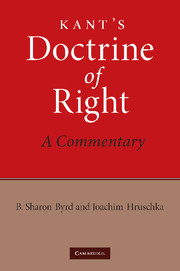Book contents
- Frontmatter
- Contents
- Introduction and methods of interpretation
- Chapter 1 The idea of the juridical state and the postulate of public law
- Chapter 2 The state of nature and the three leges
- Appendix to Chapter 2 Iustitia tutatrix, iustitia commutativa, and iustitia distributiva and their differences
- Chapter 3 The right to freedom
- Chapter 4 The permissive law in the Doctrine of Right
- Chapter 5 The external mine and thine
- Chapter 6 Intelligible possession of land
- Chapter 7 The “state in the idea”
- Chapter 8 The state in reality
- Chapter 9 International and cosmopolitan law
- Chapter 10 The “idea of public law” and its limits
- Chapter 11 Contract law I. Why must I keep my promise?
- Chapter 12 Contract law II. Kant's table of contracts
- Chapter 13 Criminal punishment
- Chapter 14 The human being as a person
- Appendix I to Chapter 14 On the logic of “‘ought’ implies ‘can’”
- Appendix II to Chapter 14 The system of rules of imputation
- Bibliography
- Index
Chapter 12 - Contract law II. Kant's table of contracts
Published online by Cambridge University Press: 05 June 2012
- Frontmatter
- Contents
- Introduction and methods of interpretation
- Chapter 1 The idea of the juridical state and the postulate of public law
- Chapter 2 The state of nature and the three leges
- Appendix to Chapter 2 Iustitia tutatrix, iustitia commutativa, and iustitia distributiva and their differences
- Chapter 3 The right to freedom
- Chapter 4 The permissive law in the Doctrine of Right
- Chapter 5 The external mine and thine
- Chapter 6 Intelligible possession of land
- Chapter 7 The “state in the idea”
- Chapter 8 The state in reality
- Chapter 9 International and cosmopolitan law
- Chapter 10 The “idea of public law” and its limits
- Chapter 11 Contract law I. Why must I keep my promise?
- Chapter 12 Contract law II. Kant's table of contracts
- Chapter 13 Criminal punishment
- Chapter 14 The human being as a person
- Appendix I to Chapter 14 On the logic of “‘ought’ implies ‘can’”
- Appendix II to Chapter 14 The system of rules of imputation
- Bibliography
- Index
Summary
Section 31 of the Doctrine of Right contains a “Dogmatic Division of all Contractually Acquirable Rights.” Kant says that a dogmatic division is a division according to a principle a priori, as opposed to a fragmentary empirical division, which cannot resolve the question of whether the division is complete. Kant claims that his division is complete and specific and thus comprises a real system of all derivatively acquirable rights.
Divisions of contracts have existed since Antiquity. The Digests understand market activity as the exchange of goods and services, and arrive at a four-part division of contracts by combining two elements, namely to give (dare) something, or to do (facere) something:
Achenwall reduces the classic four-part division to a three-part division. Kant agrees with Achenwall's reduction because Do ut facias and Facio ut des describe the same process. Kant's table of contracts, however, extends far beyond this model. As it is imperative for the reader to have the table in order to understand this chapter, we are including it here in full:
A. The gratuitous contract (pactum gratuitum) is:
(a) The keeping of entrusted goods (depositum).
(b) The lending of a thing (commodatum).
(c) The donation (donatio).
B. The onerous contract.
I. The contract of exchange (permutatio late sic dicta).
(a) The barter (permutatio stricte sic dicta). Goods for goods.
(b) The purchase and sale (emtio venditio). Goods for money.
(c) The loan (mutuum): exchange of a thing under the condition of getting it back in kind (e.g. grain for grain, or money for money).
Information
- Type
- Chapter
- Information
- Kant's Doctrine of RightA Commentary, pp. 245 - 260Publisher: Cambridge University PressPrint publication year: 2010
